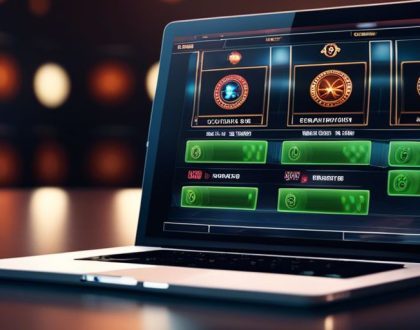Social Media’s Influence on iGaming

With the rise of #socialmedia platforms and the popularity of #iGaming, the connection between the two has become increasingly significant. Social media has become a powerful tool for iGaming companies to reach a wider audience, market their products, and engage with players in a more personalized way. However, this relationship also comes with its own set of challenges and risks that both industries need to navigate carefully.
The Evolution of Social Media in Gaming
Early Connections Between Social Platforms and Games
While the concept of connecting social media with gaming may seem like a recent fusion, the early roots of this relationship can be traced back to the early 2000s. With the emergence of online multiplayer games, players naturally started interacting through chat functions and forums, laying the groundwork for social interactions within the gaming community. Games like World of Warcraft and Second Life provided players with platforms to connect, collaborate, and form friendships within virtual worlds.
The Rise of Social Gaming and Its Platforms
For a significant shift in how social media and gaming intersect, we can look to the rise of social gaming platforms like Facebook. These platforms introduced casual, accessible games that users could play with friends, share achievements, and invite others to join. Titles like FarmVille and Candy Crush Saga became household names, attracting millions of players and blurring the lines between traditional gaming and social media.
Another critical development in this evolution was the integration of in-game purchases and virtual currencies. This monetization strategy allowed players to enhance their gaming experience by purchasing virtual goods while creating a lucrative revenue stream for developers. The social aspect of these games further incentivized spending as players could show off their purchases to friends, fueling a competitive spirit and driving engagement.
iGaming: A Brief History
The Advent of Online Gambling
If we trace back the roots of iGaming, we find its origins in the mid-1990s when the internet started gaining popularity. The first online casinos were launched, marking the beginning of a new era in the gambling industry. This shift allowed players to access their favorite casino games from the comfort of their homes, breaking the barriers of traditional brick-and-mortar establishments.
Critical Developments in the iGaming Industry
One of the critical developments in the iGaming industry was the introduction of mobile gambling. With the rise of smartphones and tablets, players could now enjoy their favorite games on the go, revolutionizing the way people engage with online gambling. Additionally, the implementation of secure payment methods and advanced encryption technologies enhanced the safety and convenience of transactions, promoting trust among players.
A significant advancement in iGaming was the integration of virtual reality (VR) and augmented reality (AR) technologies. This innovative approach transformed the gaming experience, immersing players in realistic environments and enhancing their overall enjoyment. However, this cutting-edge technology also raised concerns about addiction and responsible gaming practices, prompting industry stakeholders to take proactive measures to address these risks.
Social Media's Role in the Growth of iGaming
Marketing and Brand Awareness
Social media plays a pivotal role in the growth of iGaming by providing a platform for marketing and brand awareness. Platforms like Facebook, Twitter, Instagram, and YouTube allow iGaming companies to reach a wide audience and promote their products and services. Through targeted advertising and engaging content, iGaming brands can increase their visibility and attract new customers.
Community Building and Customer Engagement
Social media facilitates community building and customer engagement for iGaming companies. By creating online communities, iGaming brands can foster relationships with their customers, provide support, and offer exclusive promotions. Through interactive posts, live streams, and giveaways, companies can keep their audience engaged and build a loyal customer base.
Engagement with customers on social media helps iGaming brands understand their preferences and tailor their offerings to meet their needs. By listening to feedback and responding to comments, companies can strengthen their relationships with customers and build trust in their brand.
Influencers and Their Impact on iGaming
Social media influencers have a significant impact on the iGaming industry, as their endorsements and reviews can sway consumer decisions. Influencers with a strong following can introduce iGaming brands to new audiences and lend credibility to their products. By collaborating with influencers, iGaming companies can increase their reach and generate buzz around their offerings.
It is crucial for iGaming brands to choose influencers carefully and ensure that their values align with the brand’s image. Working with influencers can be a powerful marketing tool, but companies must also be cautious of potential risks, such as credibility issues or controversies that could harm their reputation.
The iGaming Experience Enhanced by Social Media
Real-Time Interaction and Live Streaming
Interaction in iGaming has been taken to a whole new level with the integration of real-time interaction and live streaming. Players can now engage with each other and with dealers in real-time, creating a more immersive and social gaming experience. Live streaming of games allows players to watch the action unfold before their eyes, adding a sense of excitement and authenticity to the gameplay.
Social Features in Online Gambling Environments
To further enhance the iGaming experience, social features have been integrated into online gambling environments. Players can now connect with friends, share their achievements, and even compete against each other in multiplayer games. These social elements add a new dimension to traditional online gambling, making it more engaging and entertaining for players.
For instance, players can join virtual communities within iGaming platforms, where they can interact with like-minded individuals, share strategies, and even form alliances. This social aspect not only fosters a sense of camaraderie among players but also adds a competitive edge to the gaming experience.
Integration of Social Media Elements in iGaming
Social media elements such as social sharing, leaderboards, and in-game messaging have been seamlessly integrated into iGaming platforms to enhance player engagement and interaction. Players can now share their gaming experiences on social media platforms, invite friends to join them in games, and even challenge each other to competitions.
Integration of social media elements in iGaming not only expands the reach of online gambling platforms but also creates a more dynamic and interactive gaming environment for players. By incorporating social features, iGaming operators are able to cater to the evolving preferences of players who seek a more social and connected gaming experience.
Regulatory Considerations and Ethical Implications
Social Media Marketing Regulations for iGaming
Regulatory bodies around the world are tightening their grip on the iGaming industry, especially concerning social media marketing. With the potential for vulnerable individuals, such as minors, to be exposed to gambling advertisements, there is a growing concern for stricter advertising regulations. Some countries have implemented age restrictions, strict advertising content guidelines, and limitations on targeted marketing to ensure responsible advertising practices.
Responsible Gaming and the Prevention of Gambling Addiction
Regulatory bodies are also focusing on responsible gaming initiatives to prevent gambling addiction. It is crucial for iGaming operators to promote responsible gaming practices, provide resources for problem gambling, and implement measures such as self-exclusion programs and deposit limits. By prioritizing player protection, operators can maintain a safe and enjoyable gaming environment for all users.
For instance, the UK Gambling Commission requires all licensed iGaming operators to take responsible gaming seriously and provide support for players who may be at risk of developing a gambling problem. Failure to comply with these regulations can result in severe penalties, including fines or loss of operating licenses. It is imperative for iGaming companies to prioritize responsible gaming to protect their players and uphold ethical standards in the industry.
Future Trends: The Integration of Social Media and iGaming
Predictive Analytics and Personalized Gaming Experiences
Despite the ever-growing popularity of social media and iGaming, the future holds even more exciting developments with the integration of predictive analytics and personalized gaming experiences. Media companies are increasingly using data analytics to understand player behavior and preferences, allowing for the creation of tailored gaming experiences that cater to individual preferences. This level of personalization enhances user engagement and satisfaction, as players feel more connected to the games they are playing.
The Role of Emerging Technologies
On the horizon of the social media and iGaming landscape are emerging technologies that promise to revolutionize the industry. From virtual and augmented reality to blockchain technology, these innovations have the potential to reshape how games are played and shared on social platforms. With virtual reality, players can immerse themselves in a whole new world of gaming, while blockchain technology offers transparent and secure transactions for in-game purchases.
With artificial intelligence driving chatbots and personalized recommendations, the gaming experience becomes more interactive and tailored to individual preferences. These technologies pave the way for a more immersive and engaging social media and iGaming experience, captivating players in ways never seen before.
Summing up
The connection between social media and iGaming is undeniable, as both industries have influenced each other in significant ways. Social media has become a powerful platform for iGaming operators to engage with players, promote their brands, and provide personalized gaming experiences. On the other hand, iGaming has leveraged social media for marketing efforts, customer acquisition, and community building. The synergy between the two sectors continues to evolve, creating new opportunities for growth and innovation in the online gaming industry.
The integration of social media into iGaming has transformed the way players interact with games, operators, and each other. The data-driven approach of social media has enabled iGaming companies to analyze player behavior, tailor their marketing strategies, and enhance the overall gaming experience. As technology advances and social media platforms evolve, we can expect further integration and collaboration between social media and iGaming to drive the industry forward and meet the changing needs of players in the digital age.
FAQs
How has social media influenced the iGaming industry?
Social media has significantly influenced the iGaming industry by providing platforms for marketing, brand awareness, and customer engagement. It allows iGaming companies to reach wider audiences, interact with players in real-time, and build online communities.
What are some key developments in the evolution of social media in gaming?
Key developments include the rise of social gaming platforms like Facebook, the integration of in-game purchases and virtual currencies, and the inclusion of social features in online gambling environments, such as leaderboards and in-game messaging.
How do social media influencers impact the iGaming industry?
Social media influencers impact the iGaming industry by endorsing and reviewing products, which can sway consumer decisions. Their large followings help introduce iGaming brands to new audiences and lend credibility to their products.
What role do regulatory bodies play in social media marketing for iGaming?
Regulatory bodies impose guidelines to ensure responsible advertising practices, protect vulnerable individuals, and promote responsible gaming. They enforce age restrictions, advertising content guidelines, and measures to prevent gambling addiction.
What future trends are expected in the integration of social media and iGaming?
Future trends include the use of predictive analytics for personalized gaming experiences and the adoption of emerging technologies like virtual reality, augmented reality, and blockchain. These innovations promise to enhance player engagement and create more immersive gaming environments.
Michael
With over 20 years experience in web design, SEO and website promotion I always give you an expert advice in regard to any issues related to your Site Design, SEO, Internet Marketing, Promotion, Backlinks, Site Content. In order to help you find out what is missing or can be improved and get higher rankings in Google and more traffic.
Recommended Posts

Inside the Realm of iGaming
July 5, 2024

Crypto Casinos: Bitcoin Impact on Online Gambling
July 5, 2024

iGaming: Exploring Europe’s Best Platforms
July 5, 2024




